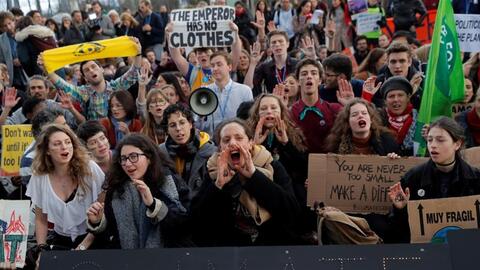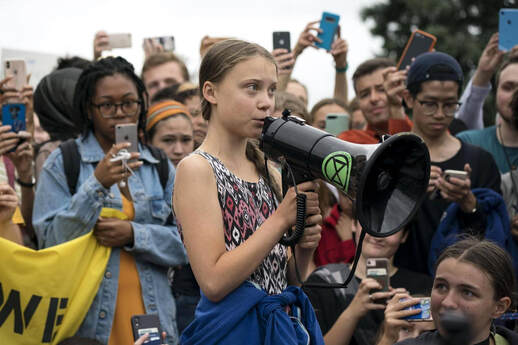|
SUSTAINABLE ENVIRONMENT
INSTITUTE Failure in Madrid; European Green Deal Adopted CCC Board of Governors Adopt Climate Change and Sustainability Goals Doomsday Clock Set at 100 Seconds to Midnight SEI Proposes Network of Weather/Air Quality Stations Air Pollution Worsening in Los Angeles Region New Climate Corps Fellow at City College In the Classroom: Resources from Carleton College UC Certificate for Citizen Scientists News Briefs |
 Youth protest during first week of COP25 in Madrid. Youth protest during first week of COP25 in Madrid.
Failure in Madrid; European Green Deal Adopted
If you missed the story in December on the United Nations COP25 climate talks in Madrid, don’t be too hard on yourself. With the exception of our major newspapers, the American media have a terrible record for covering the climate emergency. And with their focus on the House vote on impeachment, even the NY Times and Washington Post gave little attention to the story. The LA Times put it on page three. In the event, there was very little encouraging news coming out of the 25th “Conference of the Parties,” even though 27,000 delegates worked over two weeks. The conference leaders had set two major tasks for the gathering. The first, to finalize a “rule book” on the implementation of the Paris 2015 accord, was blocked by the usual obstructionists--the United States, Russia, Saudi Arabia, and Australia--joined this year by Brazil. The second task was to send a signal to the world that the UN process remained relevant and that the gap between what needs to be done and what has been agreed to could be reduced. Here too, Madrid was a sharp disappointment. While the major emitters were not expected to announce increases in their pledged reductions, it was hoped that they would announce promises to do so next year at COP26 in Glasgow, when all countries are obligated to report on their progress. That did not happen. According to the World Resources Institute, at this point only eighty countries – mostly small and developing nations – have promised to increase their pledges by 2020, and they represent just 10% of world emissions. Not a single major emitter has made a commitment to do so. On the conference's final day, a clearly disappointed UN Secretary General António Guterres said "the international community lost an important opportunity to show increased ambition” in tackling the climate crisis. Meanwhile, new UN reports show that holding warming at 1.5C is “slipping out of reach.” Global emissions are still increasing, if slightly, and even if all existing pledges are met, emissions will be almost 40% too high in 2030 to meet that target. To reach it, emission reduction pledges need to be quintupled. One bright note were continuing youth protests across Europe before and during the conference. Some thirty thousand were in the streets of central Madrid during the first week, led by Greta Thunberg and other activists. Though not comparable to the huge protests in September, they were another example of the rising international youth movement demanding action on the climate emergency. Still, the divergence between the street protests and the conference hall was marked. As Jennifer Morgan, Greenpeace executive director, put it, “I have been at every COP, and I have never seen the gap bigger between the inside and the outside.” There was, however, good news elsewhere in December: In an effort to prod countries to do more, 177 companies promised to cut their own emissions in line with the 1.5C target. The total emissions of the companies is equivalent to that of France, so it’s a meaningful step. In addition, a group of 477 investors, controlling $34 trillion assets, called on world leaders to “step up their ambition” on climate change and to increase their Paris pledges. “As institutional investors with millions of beneficiaries around the world, we reiterate our full support for the Paris Agreement and strongly urge all governments to implement the actions that are needed to achieve the goals of the Agreement, with the utmost urgency.” Also in December, European heads of state agreed to make the EU bloc “climate neutral” by 2050. They revealed a “European Green Deal” which will commit at least 25% of the EU budget to climate action. The deal also proposes a shorter timeline for boosting the EU’s promised emission reductions, cutting emissions by 2030 to at least 50% below 1990 levels. However, it remains to be seen how substantial this new plan will be in practice, as some have accused the EU of just rearranging existing commitments. Finally, the latest UN report notes that clean energy technologies have dropped dramatically in cost “as they are being deployed at an increasing scale.” |

